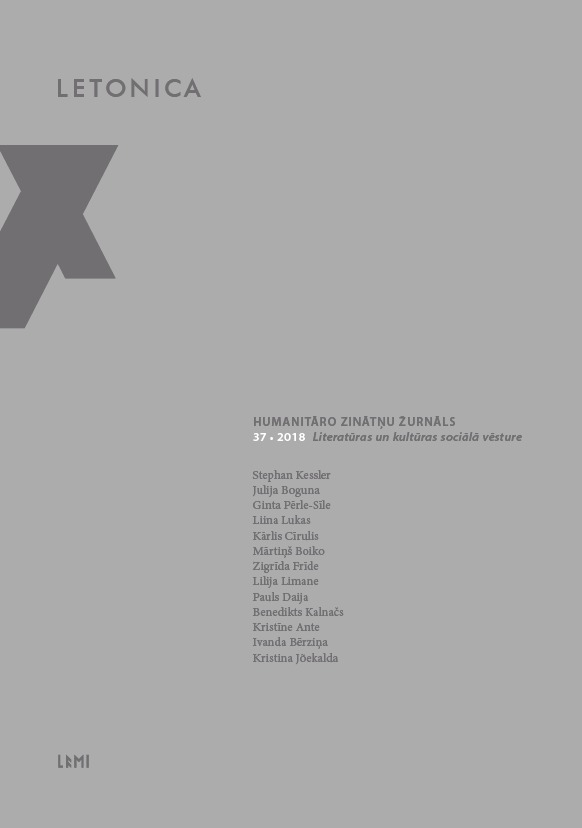Starp dievišķo un pasaulīgo: diskusijas par 19./20. gs. mijas sabiedrisko morāli Latvijas kristīgajos preses izdevumos
Between the Sacral and the Secular: Debates About Public Morality in Latvian Christian Periodicals at the Turn of the 19th and 20th Centuries
Author(s): Kristīne AnteSubject(s): History, Museology & Heritage Studies, History of ideas, Modern Age, Theology and Religion, Baltic Languages, Culture and social structure , Social Norms / Social Control, Sociology of Religion
Published by: Latvijas Universitātes Literatūras, folkloras un mākslas institūts
Keywords: public morality; virtue; Christian press; the turn of the 19th and 20th centuries;
Summary/Abstract: The turn of the 19th and 20th centuries was an important period not only in the West European countries, but also in the Russian Empire and the Baltic Provinces incorporated therein. This was the time when the old order of the world had changed and many new and previously not experienced opportunities opened up for Latvian society. People’s living conditions improved, they became more educated, self-confident and active. They started doubting the heritage left by the preceding generations and the traditions nurtured for centuries. They were willing to develop a new world, to give up the former structures of state authority, including the church. This article is aimed at analysing the attitude of various Christian confessions represented in Latvia towards the change brought by the modern century; what was considered the most important virtues and vice of the period; whether there were any differences in the opinions of representatives of various confessions and cultural historical regions on these matters and their attitude towards the new. The publication is based on the periodical press publications of various Christian confessions published in Latvian from the late 19th century to World War I. The Ev. Lutheran church is represented by the supplement Baznīcas un skolas ziņas [Church and School News], later Baznīcas ziņas [Church News] of Latviešu Avīzes [Latvian Newspapers] (1857–1900; 1902–1915). The opinion of the Orthodox on the public morality issues was obtained from the publication Rīgas Garīgais Vēstnesis [Riga Ecclesiastical News] (1902–1905), which was later published under the title Pareizticīgo Latviešu Vēstnesis [Orthodox Latvian News] (1906–1917). The Baptists’ views are represented by two publications, the religious newspaper Evangelists (1881–1887), and Jaunais Jeruzalemes kalendārs [The New Calendar of Jerusalem] (1908–1917, 1925–1934). The periodicals of the Roman Catholics are represented by the first two publications in the Latgallian written language: Gaisma [Light] (1905–1906), Sākla (1906), Auseklis (1906–1907). Because of the prohibition of Latin print it was only possible to start publishing them after 1904. During the reviewed time period, the Christian Church in Latvia was still among the most conservative forces of Latvian society. It stood for the maintenance of the current state authority and the traditional Christian values. Its attitude towards all new ideas and political opinions (for example, materialism and socialism) was undoubtedly negative. All the Christian confessions were also strictly disapproving of the participation of Latvians in the events of the revolution of 1905 by stating that the rebellion against one’s own masters (landlords) was an unfair and dishonest act. Particular criticism was directed against violence. According to the viewpoint of the authors of the Christian press publications, faith in God and obedience to the modern and secular authority was the main cornerstone of the public morality. Still, there were certain differences in this understanding among various confessions. If the Ev. Lutheran, Orthodox and Catholic press media were focusing on the obedience to God and the man (a landlord, a priest or one’s employer), the Baptists’ publications only focused on obedience to the Bible. Thus, the Baptists’ press publications emphasised the necessity of faith as opposed to obedience. Baptists (different from other Christian confessions in Latvia) were the only ones preaching the idea of equality in the Christian parish. They emphasised each individual’s responsibility for the salvation of one’s own soul, as opposed to the individual’s responsibility towards society. All the reviewed press publications agreed that drinking was the biggest vice of the Latvians (following straight after the lack of faith). The plague of drinking is a bad habit described in numerous articles of that period. The Latgallian Catholic press publications also condemned obscurantism or the lack of willingness to study as an important opportunity for self-development.
Journal: Letonica
- Issue Year: 2018
- Issue No: 37
- Page Range: 144-164
- Page Count: 21
- Language: Latvian

